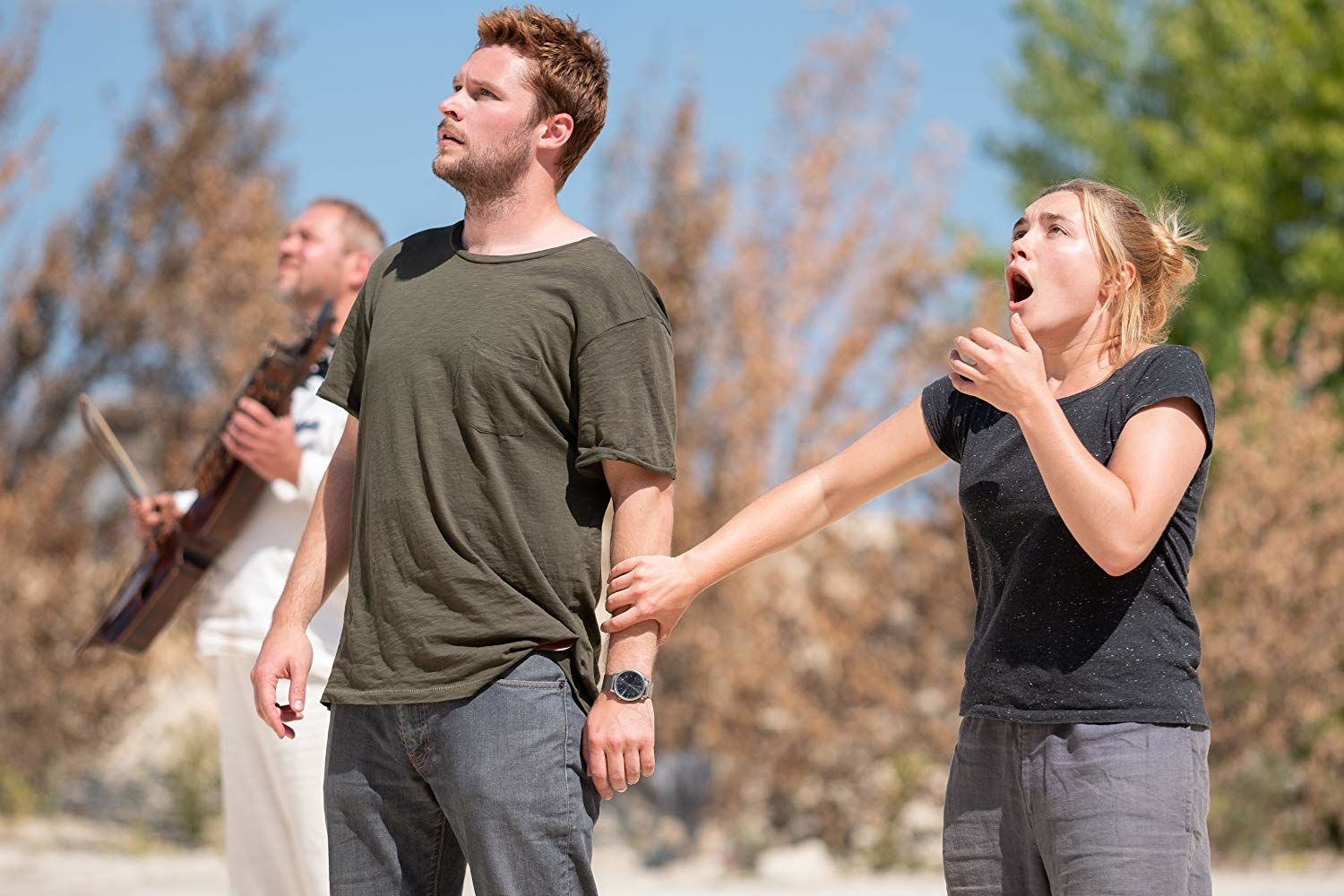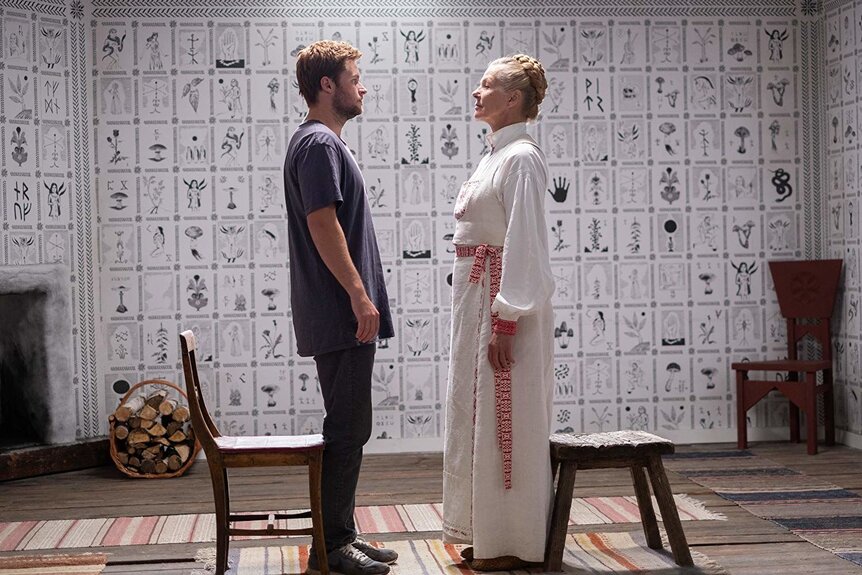Create a free profile to get unlimited access to exclusive videos, sweepstakes, and more!
Midsommar's director and star crafted a terrible boyfriend and even scarier gore

When it premiered in summer 2018, Hereditary heralded the arrival of not just another horror filmmaker, but a truly unique and imaginative voice in a genre that needs more of them. Ari Aster created a singular portrait of grief shrouded in the conventions of a terrifying psychological and supernatural thriller. His follow-up, Midsommar, is equally rapturous, but it is less easy to categorize, and more evidence that Aster has a broad and eclectic spate of influences that inspire his stories.
Starring Florence Pugh, Jack Reynor, William Jackson Harper, and Will Poulter, Midsommar explores a Swedish community's increasingly unsettling ceremony, which happens once every 90 years, through the eyes of a grieving American graduate student, Dani (Pugh), her boyfriend Christian (Reynor), and their small circle of friends.
SYFY WIRE recently spoke to Aster and Reynor about the origins of this remarkable, mesmerizing new film. We spoke about the tonal and thematic influences that bonded the director and his star, the core ideas and inspirations that drove the characters and their choices, and the often unpredictable discoveries the two made during and after production about the ideas lurking inside this ambitious film.
Both this and Hereditary feel almost accidentally like horror movies in the sense that they're so character-driven, they don't even necessarily need a supernatural element. How does that affect you getting into the character's mindset?
Jack Reynor: It was brilliant. When [Ari Aster] and I spoke about this film for the first time together, we cited a lot of tonal and stylistic references for the film in Japanese horror films going back to things like Masaki Kobayashi doing Kwaidan in the '60s and Nagisa Oshima's Empire of Passion — things where, through the use of very refined and disciplined cinematography, almost allowing the camera to become a character itself, you kind of invoke this tone of dread for the audience where we all know what's going to happen. Because we all know. We can see it. It's clear. We're shooting in broad daylight. There's nowhere to hide.
It's all very, very clear what's going to happen. But we're going to have to sit there and watch it like a car crash in slow motion. And that really is hard, but I think that his vision and the way he visually executes what happens in the film is up there with some of the greatest filmmakers, really.
Both in this movie and Hereditary, Ari, you seem to like juxtaposing a very strong character moment with a hero shot of violence or gore. How much of that is acknowledging what the moment demands, and how much is it indulging the conventions of the genre?
Ari Aster: I'm definitely a fan of body horror — I'm a big Cronenberg fan. And I like images that are upsetting and jarring, especially when I'm watching horror films. That's the stuff that stays with me, images and ideas.
And then I just really have a lot of fun with prosthetic work, working with prosthetics artists and finding beauty in the grotesque. But I'm just going by my gut most of the time. And I always dread press because I have to find ways to answer for what was instinctive — [it's] this kind of "throwing your hands up in the air" equivalent to an answer.
The movie feels like it should have the subtitle "How many signs do you need that you're in an unhealthy relationship?" Jack, how clear were the things that initially drew you to playing Christian?
Reynor: When Ari and I sat down to talk about the film together for the first time, he described his writing process with the movie and how it had come out of a dysfunctional relationship he'd been in himself — and that he was more or less the Dani character. And what he expressed to me is that he wanted there to be a multidimensionality to Christian and for him not to just be purely an antagonist and beyond redemption. I wouldn't have wanted to play that character, either.
So the challenge was to try and give some sense that this guy is also not the worst person in the world — and in some ways, he's well-meaning. He's doing what widely we would accept as the right thing by staying with her in this moment, but he's just not the right person to do the right thing. So that was one of the big elements that drew me into the project.
Ari, do you have epiphanies where you realize that what you were doing was this, even if you were just thinking on the day about what are the shots you have to get in?
Aster: Most of what I'm doing is intentional, but I find that thematic resonances occur to me later in some cases. In some cases, they're very conscious. But I am often surprised by connections I make later to other films. Like I often bring a lot of references to my films, and they typically aren't explicit, like "We're watching this because it's telling the same kind of story."
I'm usually coming in with aesthetic references, just because there are certain films and certain filmmakers that I just agree with — I just agree with their approach. And there are certain filmmakers who just were my school and I like to return to them before I make a film just to remind myself what a craftsman can do with a story.
So on this one, a big film we were talking about a lot was Black Narcissus, and we were going back to Powell and Pressburger a lot because we were dealing with sunlight and color. We did build this entire community from scratch, and Black Narcissus is a film that is set mostly outdoors, but it was built on a stage. So the challenge for us was how do we make this movie almost look like it was built on a stage, but it's not. And then at the same time, we were kind of pursuing this three-strip Technicolor look that [evokes] the way three-strip Technicolor looks in your mind when you think back on those films.
This is all a very long-winded way of saying that I'm aware of a lot of things while I'm doing them, but a lot of things occur to me, like, midway through shooting, and then it affects the way I approach the rest of the film. And then a lot of things occur to me in post-production, and then maybe I'll have an opportunity in the score, or through some editorial device, to enhance this thing that's just occurred to [me].
And then a lot of things I discover while I'm just kind of yammering in press and I realize, "Oh, shit," this came from this movie I watched when I was 10, which meant so much to me in which I take for granted at this point, but which was clearly so formative that it made me want to do something akin to that.
The movie also explores cultural differences, which draws the audience in but produces wildly different reactions through their investment.
Reynor: Yeah, absolutely. It's designed that way.
There are two elements. There's the comedic element and the folk element, which really disorient the audience and disjoint them. It's dark gallows humor that's challenging you and basically demanding of you, is this funny or is it not funny? Are you watching pure horror or is it something that you can laugh at? And similarly, with the folk stuff, this whole element in the film comes from pre-Christian and almost prehistoric cultural tradition, and it suspends all of our understandings of the social constructs and the moral code that we live by in the 21st century.
So as you're watching it, you're being challenged and you're really having to engage and constantly check in with yourself and just say, what is this? What is this horror? How much am I on board with these people? And how much am I willing to suspend before I just go, no, this is wrong? This is f***ed.



























